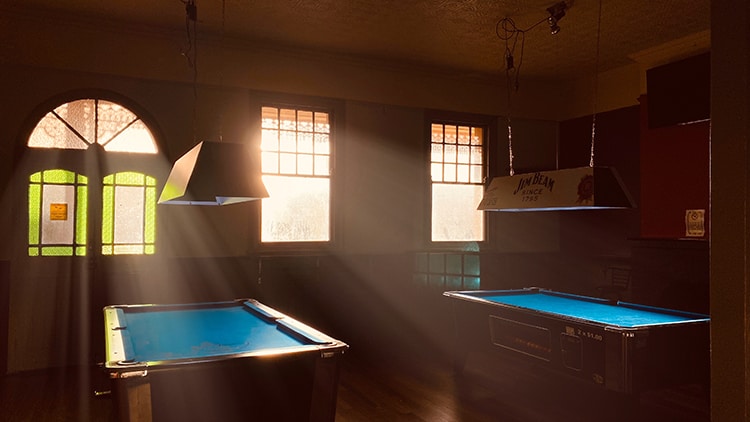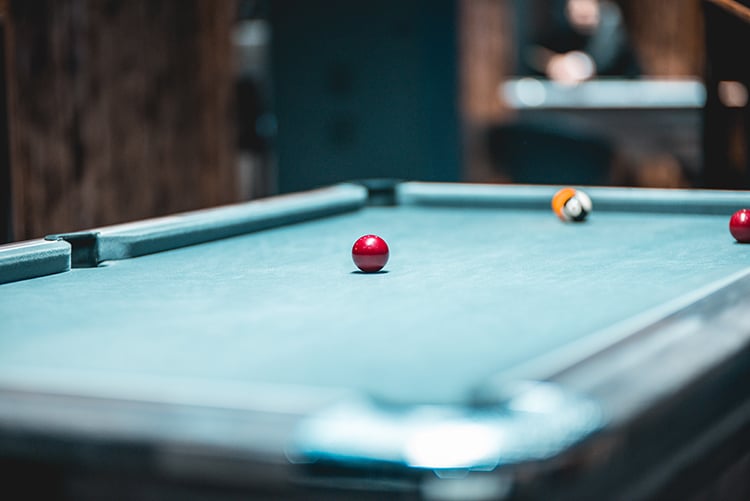When buying a new or used pool table, the quality and thickness of the slate are the most important things to look at. A cheaply made pool table with too thin slate will not last as long, and the balls will not interact with the table optimally either.
Most one-piece slates are 3/4” thick, and three-piece slates are 1” thick. However, some cheaply made tables may have slate as thin as 1/2” thick, and some manufacturers may use late that is up to 1 1/2” thick. The World-Pool Billiard Association requires that tables have three-piece slates that are at least 3/4” thick.
There are advantages and disadvantages to each thickness, so it is worth learning more about pool table slate before you make your big purchase. In this article, we will discuss what to expect with each thickness so that you can make the best decision for your circumstances.
What is the Best Pool Table Slate Thickness?
Most people would agree that a 1” pool table slate in three-pieces is the best set up for a regulation size tables, but 3/4” slate is still a good option.
- You should avoid anything thinner than 3/4” because they break easily and will begin to sag relatively quickly.
- Pool table slate that is thicker than 1″ is harder to work with because of its weight, and you aren’t likely to see a huge improvement to how the balls move across the table, but there is no real reason to avoid it.
If you’re considering buying a pool table that doesn’t have slate, you’ve got to read our post Is a slate pool table better? first!
One Inch Slate Vs. Three-Quarter Inch Slate
For the most part, you’ll be choosing between a 1” slate and 3/4” slate, so let’s take a look at some of the advantages and disadvantages:
| 1” Slate in Three Pieces | 3/4” Slate in Three Pieces | 3/4” Slate in One Piece | |
| Weight | About 500 pounds in total, with each piece being about 170 pounds | About 380 pounds in total, with each piece being about 130 pounds | About 380 pounds in total |
| Ease of Installation | Requires professional installation and leveling | Requires professional installation and leveling | Much easier to install and level on your own |
| Vibration and Movement | Less vibration and movement due to weight | May experience more vibration and movement | May experience more vibration and movement |
| Fragility | Less likely to break when moving
Less likely to sag over time |
Easier to break when moving | More likely to sag over time
Easier to break when moving |
| Leveling | Best leveling results | Best leveling results | Leveling may not be as accurate |
As you can see, the 1” inch slate offers the most advantages, including less vibration and table movement and longevity. However, installing a table with 1” slate in three pieces is more expensive because it requires expert leveling techniques and seam filling. It’s not a DIY job.
Because of this, many people choose a 3/4” slate that comes in one piece. Despite the awkwardness of dealing with one large piece of slate, it is easier to install and level the table for someone with no expertise. (Although it is important to remember that the leveling will not reach the same accuracy as with a three-piece slate.)
If you have pool table movers help with your installation process, you should check out our post on tipping pool table movers.

What about 7/8” Slate?
Some pool table makers use only 7/8” slate, but they may market it as 1” slate. If having 1” slate is important to you, you should check with the manufacturer about this. A pool table is a big investment, so you should be certain that you know what you’re getting.
That being said, a 7/8” slate is going to function very similarly to 1” slate. Most people report no significant difference. That 1/8 of an inch does seem to matter all that much.
So Which One Should You Choose?
If you play pool competitively or play on a daily basis, then the 1” slate is the way to go. Not only will your pool table play better, but it will last longer.
But a 3/4” slate is perfectly fine if you just play casually. The pool table should still hold up, and you’ll probably save a little money on the initial purchase.
The one thing you shouldn’t do is buy a pool table with less than 3/4” slate or a table that doesn’t have slate at all!

